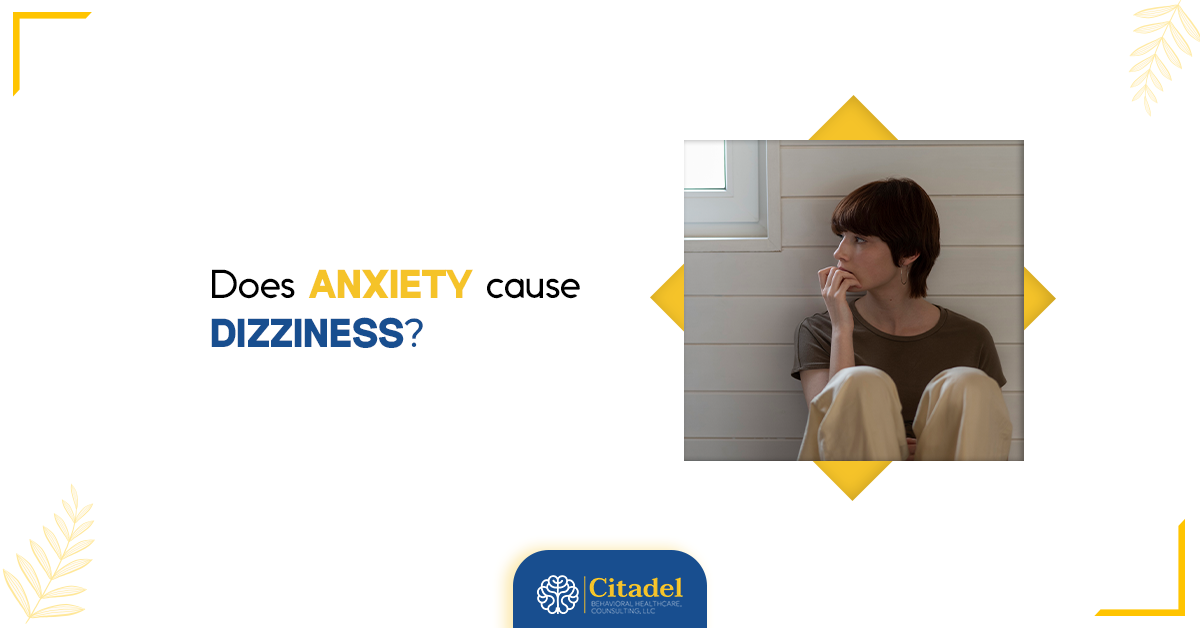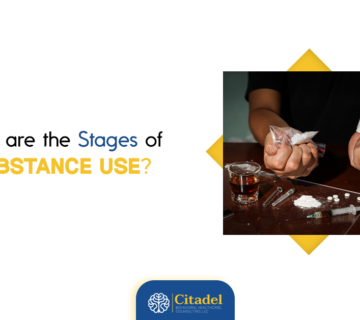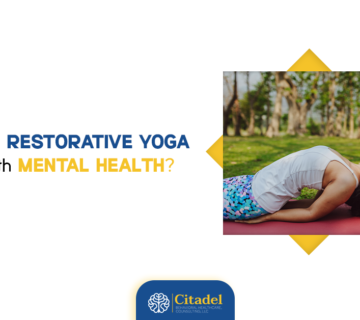Anxiety affects millions globally. It can induce sensations like dizziness, which often go unnoticed.
When anxious individuals deal with heightened episodes, they might feel lightheaded or faint. So, does anxiety cause dizziness? Or is it something else?
We’ll look into the anxiety-dizziness interaction, including bodily responses, causes, symptoms, and treatments.
Citadel Behavioral Health has extensive experience in mental health. We diagnose everything from mild anxiety to complex disorders. Our reviews reveal each patient’s mental state. This makes certain of precise diagnoses and unique care designs. For more information, please contact us.
What Is Anxiety?
First, let’s define anxiety. It’s our body’s alarm for stress. Most people experience it briefly. However, some face it constantly, leading to anxiety disorders. These include
- Generalized anxiety
- Panic disorder
- Social anxiety
- Specific phobias
How Does Anxiety Cause Dizziness?
Anxiety can cause dizziness through several mechanisms. Let’s explore the physiological processes involved.
-
Hyperventilation and Oxygen Levels
When anxious, individuals inhale quickly and superficially, leading to a disruption of oxygen levels in the bloodstream. This can induce a spinning feeling, weakness, or collapsing.
-
Changes in Blood Flow
When anxiety hits, your body springs into action. Blood moves to vital organs and muscles, preparing for a fight. However, this process can leave the brain feeling ignored.
Hence, you may feel a bit dizzy or like the room is swirling. It makes you feel off balance.
-
Increased Heart Rate and Blood Pressure
Anxiety can increase your heart rate and blood pressure. The increase impacts your inner ear, resulting in equilibrium problems.
When blood pressure changes, the inner ear responds, causing dizziness or vertigo.
-
Muscle Tension
Anxiety tightens the body like a vise. Muscles in the neck, shoulders, and head clench. This rigidity restricts blood flow, causing dizziness or lightheadedness. Often, tension headaches worsen this feeling.
-
Dehydration and Low Blood Sugar
Anxiety can extract your hydration and enthusiasm. Constant worry may leave you thirsty and drop your blood sugar.
This can cause dizziness, making the world spin. If you have other anxious feelings, the dizziness gets worse.
Signs and Symptoms of Dizziness from Anxiety
Anxiety can cause dizziness in diverse ways:
- Lightheadedness makes you feel faint.
- Unsteadiness gives a sense of imbalance.
- Vertigo gives the feeling of rotating.
- Tinnitus produces sounds in the ears.
- Nausea leads to stomach discomfort.
- Blurred vision affects clarity.
- Fatigue drains your energy.
Dizziness caused by anxiety is frequently harmless. It doesn’t indicate serious issues like strokes or ear infections. Get medical help if symptoms worsen.
Is Dizziness a Symptom of Anxiety?
Anxiety can cause dizziness due to heightened alertness. But it’s crucial to check if something else is causing it.
Conditions like inner ear problems or low blood pressure can also cause spinning sensations.
Clear distinctions help in understanding symptoms. Knowing the cause leads to the right relief. If dizziness continues or comes with other worrisome symptoms, get medical advice.
Can Anxiety Make You Faint?
Severe anxiety can cause fainting fits. High stress may lead to rapid breathing and a racing heart. This can trigger hyperventilation, disrupting blood carbon dioxide levels.
The outcome is dizziness and passing out. Though rare, fainting can happen during an anxiety episode, especially a panic attack.
What Does Anxiety Vertigo Feel Like?
Vertigo is a particular kind of dizziness that creates a sensation of spinning.
During anxiety attacks, the room may seem to sway. This can impact your balance.
This can impact your balance. It’s important to understand that vertigo related to anxiety differs from that caused by inner ear issues or other medical conditions.
How to Stop Feeling Dizzy from Anxiety?
Dizzy from anxiety? Use these calming techniques:
-
Breathing Exercises
Breathe slowly to calm hyperventilation. Use the 4-7-8 method:
- Inhale for 4 seconds
- Hold for 7
- Exhale for 8
Imagine each breath as a wave restoring balance.
-
Grounding Techniques
Apply the 5-4-3-2-1 approach to relate to your environment.
First, find five things you can see. Then, touch four things nearby. Next, listen for three sounds. After that, identify two scents. Finally, recall a favorite taste.
-
Stay Hydrated
Dehydration increases unsteadiness. Drink water to relieve stress-induced spinning.
-
Relaxation Techniques
Progressive muscle relaxation or meditation melts away tension. They reduce head pressure and calm dizziness. Accept tranquility. Anxiety takes a backseat on your journey to peace.
-
Balanced Diet
Eating small, nutritious meals regularly prevents blood sugar drops that contribute to dizziness.
What to Do When You Feel Lightheaded?
When you feel lightheaded, stay calm. Follow these steps:
- Sit down or lie down to prevent falling.
- Breathe slowly to regain calm.
- Drink water; staying hydrated helps.
- Avoid sudden movements. Don’t stand up or run quickly.
Conclusion
So, does anxiety cause dizziness? Anxiety is known to generate dizziness and discomfort. Symptoms include feeling off-balance, lightheaded, or having head pressure.
These unsettling experiences show how mental health impacts us. This can really disrupt your life.
Anxiety affects not just your nerves, but also your overall stability. Recognizing this connection is crucial to improving your well-being.
Addressing the root cause and practicing self-care helps you regain control. If dizziness and anxiety persist, get support. You’re not alone, and help is available.
FAQs
Can anxiety cause dizziness and vertigo excluding a panic attack?
Anxiety disrupts your balance, making you feel dizzy. It also tightens blood flow, worsening these unsettling symptoms.
Can stress and anxiety cause dizziness long-term?
Yes, long-term stress can cause dizziness. Your body may become more sensitive to stress, making dizziness common. However, therapy, lifestyle changes, or medication can relieve stress. This will break the cycle and restore balance.
What exercises help with dizziness caused by anxiety?
Practice stability workouts, deep inhalation, and yoga. These calming practices build a foundation against anxiety. Each breath and pose grounds you, turning unease into peace. Feel tension fade and regain your balance.





No comment